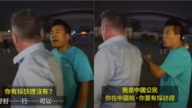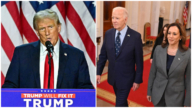【新唐人2011年10月4日訊】中共國務院總理溫家寶再提政治改革,呼籲黨政分開、司法獨立等,這是他近40天來,第6次提到政改。溫家寶如此頻繁提及政改的背景及意圖,引起各方關注。評論人士認為,這顯示中共高層的分裂,並凸顯中國的社會矛盾已經達到了不調和的狀態。
溫家寶的政治改革論,引發新一輪中共左派和右派的博弈,各方猜測中共的內部分裂和內鬥激烈。另有人認為,中共的思想體系崩潰,治國理念陷入混亂,是滅亡的先兆。
特別是今年9月14號,溫家寶在大連出席夏季達沃斯論壇時,再度高調呼籲政治體制改革,其中五大要點為:第一、依法治國,改變「以黨代政」的現象,改革黨和國家的領導制度;第二、推進社會公平正義;第三、維護司法公正獨立;第四、保障人民的民主權利,最主要的是選舉權、知情權、監督權 和參與權;第五則是反腐敗。
溫家寶甚至表明過要為推動政改「風雨不改、至死方休」。
但是,中共當局不僅沒有絲毫推動政改跡象,黨的喉舌有時甚至立即批駁溫家寶的言論,吳邦國等保守派也曾暗中反擊,撰文捍衛「一黨專政」,指絕不搞「三權分立」。有時更會收緊政治控制,甚至圍剿民間的人權鬥士。
中國歷史學專家、原首都師範大學科學學院副教授李元華,表示溫家寶喊改革也只不過是口頭上的,沒有實質上的作用:
原首都師範大學科學學院副教授李元華:「他已經說過許多次了,根本也不可能實施,也不能實施,所以就只能是空喊,如果說他從中共維護自己的專制的那個角度來講,可能能起到 一個尚對中共抱有希望的人,可能能迷糊一些人,更多的人可能早識破了。他喊不喊政改也沒有實際的作用。」
政論家胡平在接受《大紀元》採訪時表示,一旦政治改革啟動,中共不但會失去壟斷的政治權力,而且還會因經濟上的腐敗受到清算。整個官僚集團相當恐懼和敵視政改。
希望之聲時事評論員藍述:「那溫家寶之所以他要把這個東西再一次拿出來說,實際上它只不過是表明中國社會的社會矛盾已經達到了不調和的這種狀態。,就溫家寶他個人的情況來講呢,溫家寶他馬上要下臺了,他也當不了一年多的總理了,他希望給自己留下一個好一點的名聲。」
BBC中文網報導,中國自今年2月份茉莉花革命爆發以來,時不時傳出異議人士被打壓,讓人對溫家寶政改的誠意感到質疑。中國事務評論人士林和立對法新社說,當前的鎮壓浪潮至少維持到明年中共十八大之後。
李元華認為,中國的老百姓應該跳出中共宣傳的模式,不對政改抱持任何希望。
原首都師範大學科學學院副教授李元華:「因為中共的本質實際上已經決定他不可能變成一個為人民著想的一個政黨,它的任何措施不可能從人民利益的角度去出發,它只是去維護它的一黨統治,延續它的統治。」
2003年就任中共總理後,溫家寶不下十次公開談論政改,BBC中文網指溫此次是「例行」談政改。
新唐人記者劉慧、林慧心、郭敬採訪報導。
Recently, Chinese Premier Wen Jiabao again
proposed political reform,
calling for separation between Party and government,
and judicial independence.
This is the 6th time that he proposed political reform
in the past 40 days.
Wen』s agenda behind these proposals
has attracted widespread public attention.
Commentators believe that
this shows the division in CCP leadership,
as well as the irreconcilable contradictions
in Chinese society.
Wen』s new political reform proposal triggered
another round of fights between the leftists and rightists,
showing the internal division within the CCP.
Some people believe that CCP』s administrative principles
have collapsed, which is a precursor to its falling apart.
This year, Premier Wen Jiabao attended
the Summer Davos in Dalian on Sept 14th.
He once again called for high-profile political reform,
suggesting five main points: 1) to rule the state to the law,
change the Party』s dominance over government,
and reform the Party』s leadership system;
2) to promote social fairness and justice;
3) to maintain judicial impartiality and independence;
4) protect people’s democratic rights,
in particular the right to vote, right to be informed,
to supervise and to participate;
5) to fight against corruption.
Wen Jiabao even claimed that he would spare effort
to promote political reform “until his death."
However, the Chinese authorities show no intention
of promoting political reform.
Instead, the Party mouthpiece media,
sometimes even immediately, refuted Wen’s speech.
Wu Bangguo and other conservatives have fought back,
writing articles to defend the “one-party dictatorship."
They claimed never to exercise “separation of powers,"
and even tightened political control
to suppress human rights movements.
Li Yuanhua, a Chinese historian and former Associate Professor
in the Department of Science at Capital Normal University,
said Wen』s pronouncement goes no further
than mere speech, without any substantial impact.
Li Yuanhua, a Chinese historian and former Associate Professor
in the Department of Science at Capital Normal University:
He[Wen] has said it many times,
but it is impossible to be implemented.
It remains only empty talk.
If someone still has hope for the CCP,
he might be deceived by Wen』s words,
but more people have already seen through it.
They know that however loud he calls,
there is going to be no change.
In an interview by The Epoch Times,
political critic Hu Ping said, once political reform gets started,
CCP will not only lose political power,
but also face punishment for their financial corruption.
The whole bureaucratic group fears
and resists political reform.
Lan Shu, critic at Sound of the Hope Radio:
“Wen proposed political reform once again
only to show that the social conflicts in China
are already irreconcilable.
Wen is to step down soon,
so he wants to gain a better reputation.”
BBC Chinese reported that many dissidents in China have
been suppressed since the Jasmine Revolution in February,
causing doubts about the sincerity of Wen』s words.
Chinese affairs expert Willy Lam told AFP
that the current wave of repression will continue
at least until the 18th CCP Assembly next year.
Li Yuanhua said that Chinese people should jump out of
CCP』s propaganda and abandon any hope for political reform.
Li Yuanhua, a Chinese historian and former Associate Professor
in the Department of Science at Capital Normal University:
“The CCP』s nature determines that
it can never become a party for the people.
Whatever measures it takes,
it is not out of concern for the people,
but only for its rule and dictatorship.
After taking office in 2003, Chinese Premier Wen Jiabao
has talked about political reform at least ten times.
BBC Chinese refers to the new proposal
as “routine talk" about political reform.
NTD reporters Liu Hui, Lin Huixin and Guo Jing




























